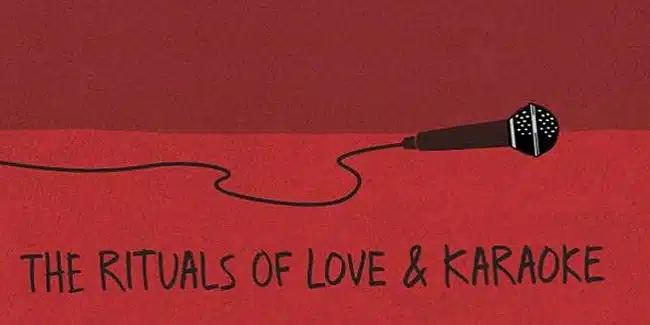
Rob Sheffield’s singular talent is in the encyclopedic range of his rock geekdom, his alacrity for explicating the irony and meaning and social significance of our popculture moments and rock heroes, and his extraordinary turns of phrase as he twists and invents new idioms on every page. And he’s hilarious. No one in the history of rock criticism has come close to bringing more pants-wetting laughter to the form than Sheffield.
Rob’s first two books had titles and subjects that were squarely in my wheelhouse: Love is a Mix Tape, loosely organized around the concept of making mix tapes for girlfriends, something I spent the majority of my teen years doing, and Talking to Girls About Duran Duran, which again appealed to two of my favorite teenage pastimes, talking to girls and talking about music, whether the subject was Duran Duran or any of the other ‘80s bands that were popular and/or polarizing when I was in high school.
Sheffield’s new one, Turn Around Bright Eyes is, like Sheffield’s other two books, loosely structured around a single subject, in this case karaoke, although again like the others, Sheffield ranges freely over any topic that he feels is worth exploring, in each case getting very far from the controlling idea. Compared to Mix Tape and Talking to Girls, I was less exhilarated by a book framed by karaoke; in fact, for some reason, I sort of wish Sheffield didn’t sing and/or love karaoke.
I’ve always thought karaoke was fairly excruciating, whether when performing it or, especially, when listening to others massacre songs. I always find a certain satisfaction in agreeing with Sheffield’s opinions, which is nearly always, so identifying this difference in our passions gave me a slight pause going into this book, even though I knew he’d change the subject before long.
Then again, Sheffield’s passion for low culture is one of the things I’ve always loved about him. His unashamed love of trash-pop culture is another of the endearing qualities that separate him from other rock writers; he demonstrates no musical prejudices whatsoever. He loves what feels good, even when it’s bad. In fact, he goes out of his way to embrace art that is so bad that it’s good (as with his hilarious take on Lifetime movies in the new book), but he often refuses to qualify such distinctions.
Therefore, he can hold forth with equal enthusiasm and expertise on the genius of both Bob Dylan and Designing Women. When Rolling Stone needs the definitive album-by-album analysis of the Beatles, the Stones, or Springsteen, they signal Sheffield out of the bullpen. And when they need a thousand words on Britney or the latest VMA twerkwreck, Rob’s their guy then, too.
So Sheffield has done enough for me—as a writer, educator, influence—that he’s earned the right to pontificate about karaoke and any of his other personal peccadillos and still expect to me to read it and pay close attention. Plus, the karaoke sections, as with the rest of his autobiographical writing, come with plenty of deprecation, of both himself and his obsessions. For example, with karaoke: “Admitting the fact that you have a problem is the first step toward making it an even bigger problem.”
Turn Around Bright Eyes leans heavily on such bluntly honest self-analysis, digging deep into his current marriage and his relationships with his parents, scrutinizing, for example, a specific moment when his father said something life-altering to him, which Sheffield connects to the fact that he has never, to this day, seen Jaws. His propensity to always bring things back to a pop culture reference is Sheffield’s bread and butter, and it’s when I like him best, even though I’m happy to roll along with his passages on why he’s a better husband than he is a boyfriend and on which part of his face he tends to miss when he shaves.
But when he focuses purely on a single pop-culture subject, especially rock music—and the new book includes essays about the Beatles (“girls are like the White Album”), Neil Diamond, Rush, and David Bowie—he’s peerlessly brilliant. I recently wrote a lengthy review of Rod Stewart’s new record, in which I thought I had fairly effectively explained the essence of Rodness. So when I started reading the “Hot Legs” chapter in Turn Around Bright Eyes and realized that it was going to be a 5,000-word essay on Rod Stewart, I almost dreaded reading it.
After all, I knew it would be the Rod Stewart essay that canceled any other ever written. And it is. Reading Sheffield’s music essays is like listening to Sam Bush play the mandolin—at times, it inspires to pick up the instrument and practice; at other times, it makes me want to chuck my mandolin into the fireplace.
Speaking of playing instruments, Sheffield can’t. He spends much of the book discussing his own musical ineptitude. It’s just another fascinating aspect of Sheffield’s talent—how does someone write so consummately about rock music without knowing any guitar chords? He goes pretty far to answer this question during the new book’s section on Rob’s experience at a Rock Fantasy Camp, in which he sang and played tambourine in one of the camp’s pick-up bands.
What he makes clear is that, above all, Sheffield is a fan—a supersmart, insightful, funny, passionate one, who delights in the visceral and communal pleasures of popular music. For instance, Sheffield pains over saying just the right thing to the C-list rock stars at Fantasy Camp—usually by expressing appreciation for their lesser-known work—because he imagines it will help them feel happy and fulfilled and appreciated.
For his own part, in Turn Around Bright Eyes, Sheffield reveals that he’s a happy and fulfilled dude. Still, if I ever met him, I’d want to mention my favorite Rob Sheffield lines, obscure quotes I remember, long-lost bits that he wrote that I imagine he assumes no one retains. That’s what Rob would do.
